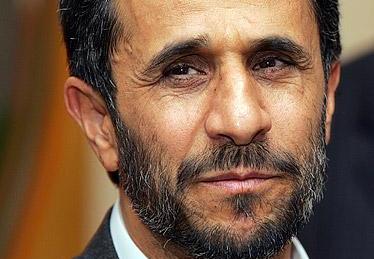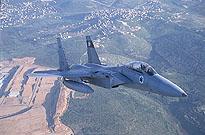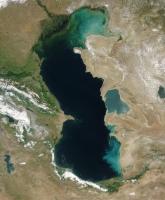Iran Archive
Free Newsletter

In 1973, it would have been hard to imagine anyone would ever wax nostalgic about the Cold War. How times have changed. There is nothing like almost three years of Iranian President Mahmoud Ahmadinejad to help burnish the memory of former Soviet Premier Leonid Brezhnev. The Cold War was an expensive and deadly conflict, sapping trillions of dollars over four decades and resulting in tens of millions of lives lost. Energies that could have been devoted to human betterment were directed instead toward human destruction. The Cold War had its successes, from spurring scientific advancement to putting a man on […]

In late May and early June, Israeli forces carried out massive military exercises over the eastern Mediterranean Sea. The operation, reportedly codenamed “Glorious Spartan 08” unfurled a show of force worthy of Hollywood’s epic movie producers. The maneuvers, everyone quickly surmised, looked very much like the kind of military operation Iran would see over its own skies if Israel (or the United States, or NATO) decided that diplomacy has reached a dead end in its efforts to stop Iran’s nuclear program. On the surface, the exercise offered Israeli forces the opportunity to practice. But it was much more than that. […]
Diplomatic engagement with Iran is inevitable, not because they’re “ten feet tall and on a roll,” as this WaPo article (via Laura Rozen) puts it, or even because they’re “dangerous, and clever, and good at asymmetric warfare.” Diplomatic engagement is inevitable because it’s the only official means of communication between nations besides war, and war is in neither Iran’s nor our interest. On the other hand, I don’t think that diplomatic engagement should be organized under a logic of “[T]hey have a lot of vulnerabilities — and. . .we can exploit them.” At this point, too, how to manage the […]
It looks like the EU went ahead and froze the European assets of Iran’s Melli Bank, and banned its activities on the continent. The bank, suspected of providing services to Iran’s nuclear and ballistic missile programs, had already been targeted by American sanctions last year. The move had been prematurely announced by English PM Gordon Brown last week and immediately denied by the EU, and comes on the heels of a supposed “freeze for freeze” offer, whereby Iran would agree to hold off on any increase in its uranium enrichment capacity in return for the EU3+3 holding off on any […]
Ali Larijani is emerging as one of Iranian President Mahmoud Ahmadinejad’s principle rivals among conservatives, and while some people have suggested that this is an encouraging sign, I’ve never found it too reassuring. This Sami Moubayed profile of him over at Asia Times Online gives an idea why: The two men differ in style, not in substance. Both want to continue to support Hezbollah in Lebanon. Both want to pursue Iran’s dream of nuclear power for civilian use and refuse to grant concessions to the Americans, and both strive to export the Islamic revolution outside its borders, to neighboring countries […]
You’d think the idea of a naval blockade of Iran would have raised the eyebrows of advocates for an Iran policy that, if it doesn’t manage to prevent a worst case scenario, at least doesn’t start off just a hair-trigger incident away from one. But instead the idea, which I first (and last) saw mentioned offhandedly in the Israeli press about a month ago, has flown under the radar to emerge fullgrown as one of the conventional wisdom options for pressuring Tehran to freeze its uranium enrichment program. According to Laura Rozen, it’s something to keep your eyes on, and […]
In case you haven’t seen it yet, ISIS (via Laura Rozen) has posted an English-language version (.pdf) of the EU3+3 Iran proposal I referred to yesterday. And in comparing it to the last concrete offer made in June 2006, it’s very clear that the major difference is in the political incentives added to sweeten the deal. Here’s the political component, circa 2006: Support for a new conference to promote dialogue and cooperation on regional security issues. Here’s the same section from this week’s offer: -Improving the six countries’ and the EU’s relations with Iran and building up mutual trust.-Encouragement of […]
Lots of confusion to sort through when it comes to the EU3+3 proposal just delivered to Iran. Iran rejected the offer. Or it didn’t. The EU foreign ministers meeting in Brussels agreed to freeze the assets of Iran’s largest European banking outlet, the Melli Bank. Or it didn’t. And Iran removed $75 billion from its European accounts as a precaution. Unless, of course, it didn’t. The proposal itself (I’ve read the French version here (.pdf), and I’m trying to track down an English version, but you can get a sense of it here and here) offers a trust building “freeze […]
Hats off to Hampton for live-blogging the CNAS Iran panel yesterday. Given how much trouble I have transcribing a sentence or two from a recording that I can go back and replay, I’m impressed. As for the panel itself, Dennis Ross makes a bunch of points that I’ve been underlining for a while, namely the dangers of regional proliferation that a nuclear Iran poses, and the fact that deterrence is an entirely unsatisfactory outcome to this impasse. I also really liked his formula of “weak carrots and weak sticks” to sum up our policy to date. For me, the strong […]
I’m attempting to live-blog the Iran panel at the Center for a New American Security’s “Pivot Point” conference in Washington. We’ll see how this goes . . . Panelists are Nicholas Burns, James Miller, Dennis Ross, Suzanne Maloney, James Dobbins. Ambassador Burns sets the theme of the discussion: Should the next president continue the current U.S. policy of sanctions to try to persuade Iran to abandon its program, and of conditioning talks on that goal, or should he drop many of the preconditions for diplomacy, as a new CNAS report suggests? Miller begins to Summarize the CNAS report. Other panelists […]
Thomas Barnett’s got about the most clearcut, incisive rundown of the strategic reality we face in terms of Iran that I’ve seen to date. We can’t afford to be naive about Iran’s intentions. But neither can we afford to be naive about our own leverage, which are tactically diminished right now. That means it’s time to start thinking about the long play. So, sure, containment (as opposed to isolation), but combined with engagement. The fact is, the only things that even raise Iran to the level of irritation are its location and its oil reserves. That’s two major factors to […]
Returning from their brief holiday hiatus, foreign policy committees on the Hill fielded testimony last week about U.S.-Chinese cooperation in Africa and Iran’s latest strategic aspirations in the Middle East. The Senate Foreign Relations Committee’s Subcommittee on African affairs began the week with a discussion of China’s involvement in Africa, and ultimately, its implications for U.S. foreign policy. James Swan and Tom Christensen, the deputy assistant secretaries of state for African affairs and East Asian and Pacific affairs, respectively, opened the hearing with a rather optimistic assessment of China’s African interests: In general, we see China’s growing activity on the […]
Sam Roggeveen at The Interpeter (another new addition to the blogroll) makes some good points about Iran’s nuclear weaponization program. (Although the only time there was a “D” in Grunstein was back when I was playing pickup ball in NY. No harm, no foul, Sam.) As Sam rightly notes, as important as Iran’s intentions (which we can neither prove nor disprove, and which are subject to change) is the fact that any possible weapons capacity is significantly delayed by freezing the weaponization component of their program. That’s what’s known as a window of opportunity, no matter how slight the opening, […]

The recent improvement in relations between Azerbaijan and Turkmenistan could help remove a major obstacle to the exploitation of Caspian Sea energy reserves. When Gurbanguly Berdymukhammedov arrived in Baku on May 19, he became the first Turkmen president in over a decade to visit Azerbaijan. The two countries severed ties in 1999 over an Azerbaijani decision to develop an oil and natural gas field that the Turkmenistan government also claimed. Until now, the unresolved dispute among the five Caspian states over how best to divide and manage the sea and its valuable subsurface natural resources has impeded efforts to exploit […]
Adam Blickstein is right in arguing that restoring the intelligence community’s credibility will be essential to the ability of any future presidential administration to mobilize public opinion for a necessary intervention. Whether or not that’s possible in an age of “all info ops, all the time” remains to be seen. There will always be both known and unknown gaps in our intelligence, and how they are used to drive policy is often an essentially political decision. Jeffrey Lewis, in a post I flagged yesterday, called attention to the different ways in which the Clinton and Bush administrations assessed a known […]
